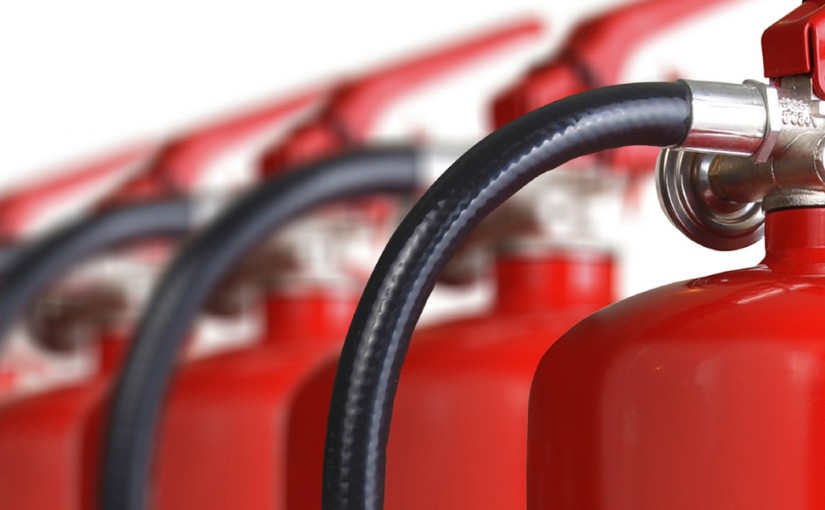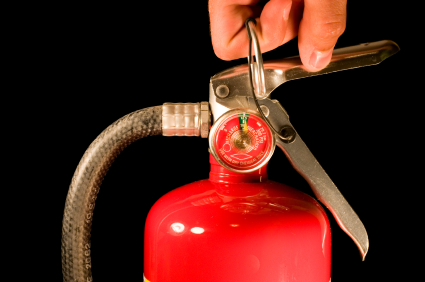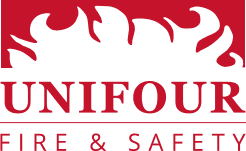
How Are Fire Extinguishers Classified?
 When it comes to putting out fires quickly, reducing property damage, and saving lives, little is more effective than a fire extinguisher in the hands of a capable employee. Of course, the effectiveness of a fire extinguisher depends on its classification and the type of fire you’re dealing with. By learning about fire classes and the extinguishing agents used to fight each one, you can gain a better understanding of which extinguishers to install in your building. Keep your business up to code with reliable, modern fire extinguishers. Call us today at 866-511-5540 or contact us online.
When it comes to putting out fires quickly, reducing property damage, and saving lives, little is more effective than a fire extinguisher in the hands of a capable employee. Of course, the effectiveness of a fire extinguisher depends on its classification and the type of fire you’re dealing with. By learning about fire classes and the extinguishing agents used to fight each one, you can gain a better understanding of which extinguishers to install in your building. Keep your business up to code with reliable, modern fire extinguishers. Call us today at 866-511-5540 or contact us online.
Fire Extinguisher Classes
Fire extinguisher classes are determined by the types of fires they are designed to extinguish. See the purpose of each class below:
- Class A extinguishers put out ordinary fires that involve everyday combustible materials, including paper, cloth, wood, cardboard, and plastic. This type of fire can occur in any home or typical business setting.
- Class B extinguishers fight flammable liquid fires. Burning oil, gasoline, kerosene, and propane can spread fire incredibly quickly, making them very destructive. Class B fires can occur anywhere flammable liquids are used or stored.
- Class C extinguishers are effective at fighting electrical fires without creating an electrocution risk. Any time a spark from a faulty appliance, short circuit, or overloaded outlet ignites a flame, it’s considered a Class C fire, no matter what objects are burning.
- Multipurpose extinguishers are common. You might find AB, BC, or ABC extinguishers designed to put out a combination of ordinary, flammable liquid, and electrical fires, which are the most common types that occur in homes and businesses.
- Class D extinguishers are designed for combustible metal fires. Sodium, potassium, titanium, and magnesium are all examples of combustible metals, which may be found in chemical laboratories and industrial buildings.
- Class K extinguishers put out kitchen fires. Because cooking grease and oil burn at a higher temperature than other flammable liquids, this special classification is needed for restaurants and other commercial kitchens.
Types of Fire Extinguishers
Various extinguishing agents are used to put out Class A, B, C, D, and K fires. Consider your choices:
- Dry chemical extinguishers are the most widely used type of extinguisher. They are effective against Class A, B, and C fires because they create a barrier between the oxygen in the air and the fire’s fuel source to choke out the flames.
- Clean agent extinguishers put out Class A, B, and C fires. Older halogenated models are still in use, but newer and less ozone-depleting halocarbons are the only type of clean agent extinguishers manufactured today.
- Water mist extinguishers are safe to use against Class A and C fires. They are a viable alternative to clean agent extinguishers when contamination and cleanup is a concern.
- Water and foam extinguishers are for Class A fires only. They disrupt the fire triangle by cooling and smothering the flames to cut off the oxygen source.
- Carbon dioxide extinguishers are effective against Class B and C fires. They replace the oxygen in the vicinity with carbon dioxide and cool the flames with their icy discharge.
- Dry powder extinguishers are for Class D fires. They are ineffective on all other fire classes.
- Wet chemical extinguishers are for Class K fires. They work by removing heat from the fire triangle and creating a barrier between the oxygen and the fuel source to prevent re-ignition. You can also use wet chemical extinguishers to fight Class A fires that break out in commercial kitchens.
Our Fire Extinguisher Services
When you need to add to, upgrade, or service the fire extinguishers in your commercial building, turn to our team at Unifour Fire & Safety. We have all the services you need to keep your fire extinguishers charged, working, and ready for an emergency, including:
- Fire extinguisher sales – Our experts can work with your team to evaluate your fire extinguisher needs and equip your building with the appropriate types for each area and the hazards expected.
- Fire extinguisher inspections – Over time, fire extinguishers can leak, depressurize, corrode, or become damaged, leaving them useless in an emergency. Our fire extinguisher inspections evaluate each extinguisher to ensure they are fully charged, working, and ready for a fire.
- Fire extinguisher repair – When you have damaged fire extinguishers, our repair services can save you money by repairing and recertifying your fire extinguishers rather than replacing them.
- Fire extinguisher recharging – Do you have fire extinguishers that were used or have leaked? Our recharge services can make sure they are refilled properly and made ready for the next emergency.
- Fire extinguisher replacement – When you have fire extinguishers that have major damage, corrosion, or are just too old to remain in service, our team can replace them with the latest models at competitive prices.
To schedule fire extinguisher services in the Southeast U.S., call 866-511-5540 or contact us online today.

Contact Unifour Fire & Safety for Fire Extinguisher Sales & Installation
Is your commercial building in Georgia, North Carolina, or South Carolina in need of new fire extinguishers? Talk to our experts at Unifour Fire & Safety. We offer fire extinguisher sales, installations, and more, and we have been helping businesses throughout the Southeast United States prevent fires since 1984.
From fire sprinkler systems and fire alarms to advanced fire suppression systems, we have the services you need to protect your staff and prevent unnecessary property damage.
Call us today at 866-511-5540 or contact us online to learn how Unifour Fire & Safety can help to keep your business up to code and protected with reliable, modern fire extinguishers.
 Click to Apply
Click to Apply 


